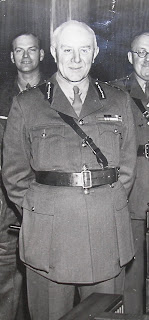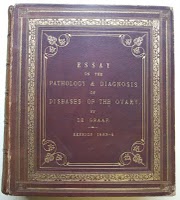New Archive Collections for August
I realise the month is nearly over, but I just have time to give some details of the new archive collections which have been made available in August. As with all the archive collections details can be found in our online catalogue, and complete collection lists can be downloaded from the archive's webpage. This month I have completed cataloguing of four collections.
Royal National Hospital for Consumption for Ireland
In 1891, at the instigation of Miss Florence Wynn, a provisional committee meet in Dublin with the aim of founding a national sanatorium to treat tuberculosis. The hospital was opened by Lady Zetland in May 1896, with 24 beds, the numbers rising to 125 by the outbreak of World War One. X-ray facilities were added in 1935 and a modern operating block in 1936. In the early years of the hospital's existence there were strained relationships between the medical staff and the Board of governors, with the medical staff feeling that the board were interfering unnecessarily in the methods of treatment. This came to a head in 1912 when Dr Crofton was appointed visiting physician causing the rest of the medical staff to resign. When Crofton left in 1927, the former medical staff returned on condition they were given representation on the board of governors.
 |
| The Royal National Hospital for Consumption for Ireland |
By the 1930s the narrow terms of the hospital's original aim, the treatment of pulmonary tuberculosis only, was limiting the effectiveness of the hospital. In 1932 the memorandum of association was changed to allow the hospital to treat all forms of tuberculosis. In the 1950s as the treatment of tuberculosis changed, and fewer sanatorium beds were needed, the hospital again had to consider its aims, the name was changed to the Newcastle Hospital and the types of patients that could be accepted were reviewed. In 1963 the Newcastle Hospital closed.
The archive holds administrative, financial and patient records, as well as plans and documents relating to the building and maintenance of the hospital, and newspaper cuttings.
Major-General Francis Joseph O'Meara
 |
| Major-General O'Meara |
Francis Joseph O'Meara was born in County Cork in July 1900 to a medical family. He was educated at Clongowes Wood College and Trinity College Dublin, where he received his MB in 1923. O'Meara joined the British Army in 1918 in the Officer Training Corps. He left to study medicine, rejoining the Royal Army Medical Corps in 1923, serving in Egypt and India. On the outbreak of the Second World War O'Meara was with a casualty clearing station in France, where he established an Ambulance Corp. In June 1940 he was captured by German soldiers and spent the next four years in captivity in various internment camps in France and Germany. Following his release and recovery O'Meara returned to Germany as the consulting physician to the British Army of the Rhine from 1945-1950. From 1950 onwards he held positions in the near and far East. In 1954 he was appointed as director of the medical services for the Middle East Land Forces and from 1956-1959 he was director of medical services, Western Command. O'Meara retired to Herefordshire where he died in 1967.
The archive holds papers covering O'Meara's time in the Royal Army Medical Corps during the Second World War as well as a small number of personal and family papers, and some family photographs.
 |
| RAMC training Camp |
Individual Manuscripts and Individual Bound Manuscripts
 |
| BMS/34 |
These two lists contain details of all the individual bound and loose manuscript items held by the archive, amounting to over 110 items. Included in the lists are case books, diaries, certificates, letters, essays, flyers, agreements, minute books, notes and ephemera relating to a variety of aspect of the history of medicine and medical education in Ireland. These lists include some of the archive's least used items, including many items which were re-discovered during the cataloguing process.
As with all collections held by the archive, these records can be consulted by appointment, the reading room is open from 9.30am to 5pm Monday to Friday, closing between 1pm and 2pm for lunch.